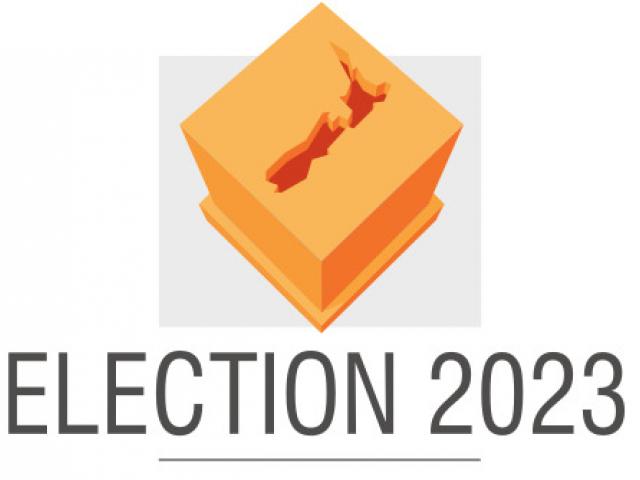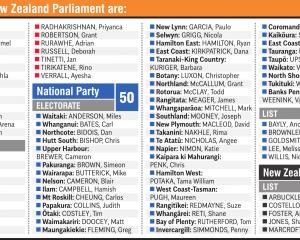
The past term has been a challenging time for New Zealanders across the board, with the rising costs of living, Covid restrictions and housing being just some of the issues on people’s minds.
With support for the country’s two major parties, Labour and National, at its lowest point in two decades, minor parties are looking to capitalise on a potential power vacuum.
The Southland Express asked three questions of each candidate in the Invercargill and Southland electorates to help Southlanders cast their vote for the candidate right for them.
The questions were:
Q1: What is your top priority for the region?
Q2: What are your plans for the future of Zero Fees and Te Pūkenga?
Q3: What are your thoughts on co-governance?
We asked for each answer to be 50 words, so some of them have been cut for fairness.
Southland candidates
Joseph Mooney,
National

More doctors, nurses and midwives to support rural healthcare, and delivering 13 new cancer treatments National will fund.
Supporting our teachers to ensure our children can do the basics brilliantly — reading, writing, maths and science.
Q2: Te Pūkenga should be disestablished and decision-making returned to the regions. Zero Fees should be decided on by Southlanders.
Q3: I oppose co-governance of public services, which should be focused on need not ethnicity.
Logan Evans,
New Zealand Loyal

Q2: I don't have a plan for that. I know it's been a great asset to the Southland community. At NZ Loyal our whole ethos/mantra is to work with the people of New Zealand to achieve positive outcomes within our communities, so that's what we'll do, engage with the community to hear their views, then create plans around the feedback we receive.
Q3: Co-governance must be stopped. At NZ Loyal we believe in One Nation, One People. As a nation we need to be forward-thinking and look to where we want to be in 100 years. All we see with co-governance is separatism and we can't support that.
Dave Kennedy,
Greens

Q2: The Te Pūkenga restructuring has been poorly managed but greater collegiality across teaching staff will strengthen teaching consistency. The Green Party will overhaul the funding model so that all institutions are sustainable and operate for the public good. A universal weekly payment of $385 will be provided for all students.
Q3: Co-governance has already worked well in Southland. The process honours our Te Tiriti o Waitangi obligations and allows for shared wisdom when achieving consensus decisions around our shared resources. Maori values such as kaitiakitanga, manaakitanga and kotahitanga provide useful perspectives to decision-making for the benefit of future generations.
Simon McCallum,
Labour

Q2: Labour in government announced a review of the funding systems for the tertiary sector and $128 million to support tertiary until the review is done. This review could remove all fees and fund education differently. We need innovative solutions to ensure that Southland and Invercargill are attractive to students.
Q3: New Zealand has a unique history. The Treaty as a founding document for our country gives us an opportunity to lead the world in creating meaningful partnerships between indigenous people and the Crown. Co-governance is a co-operative process to find solutions, it is not the competitive, zero-sum game where cultures compete.
Anntwinette Grumball,
Aotearoa Legalise Cannabis Party
Did not respond by deadline.
Todd Stephenson,
ACT

Q2: SIT students benefited from Zero Fees before the government introduced national Fees Free. SIT made its programme successful by working with local businesses to address areas of skills shortages. National Fees Free hasn’t worked. The government's tertiary reforms have taken local control away and have cost the taxpayers huge amounts of money. ACT would disestablish Te Pūkenga and return SIT to Southland control.
Q3: ACT New Zealand believes in equal rights and is opposed to co-governance. New Zealand must continue to strive to be a prosperous, multi-ethnic democracy with equal rights and duties for all.
Naomi Maclean,
Vision NZ
Did not respond by deadline.
Invercargill candidates
Kevin O’Connell,
Aotearoa Legalise Cannabis Party

Q2: Totally support. ALCP is very pro educating New Zealand. I’m a graduate myself of SIT carpentry. Free trade — great course (but personally blocked from rebuild career 12 years ago due to drug testing). Invercargill is a great city and Zero Fees has really helped Invers get to a new level!
Q3: The party has Aotearoa in the name — that reflects our centring in the principles of the Treaty, in our founding constitution in 1996. We are happy with current settings. This debate is a red herring. Perverse criminalisation of whole New Zealand whanau is a far more serious issue. Kevin for uniting Invercargill!
Scott Donaldson,
ACT

Q2: SIT students benefited from Fees Free well before the government introduced Fees Free. The difference is that SIT made it work very successfully, combining with local businesses to address areas of skills shortages. The government's tertiary reforms have taken local control away and is costing taxpayers huge amounts of money. In fact, ⅓ of all students who received the government Fees Free scheme dropped out. The ACT Party would disestablish Te Pūkenga, and return SIT to Southland control.
Q3: The ACT Party believes in equal rights and is opposed to co-governance. New Zealand must continue to strive to be a prosperous, multi-ethnic democracy with equal rights and duties for all.
David Kowalewski,
New Zealand Loyal

Q2: The Zero Fees initiative will be supported by NZ Loyal. We will decentralise all universities and institutes of technology so that they reflect local initiatives and needs. We will encourage the return of critical thinking, discovery and open-minded learning.
Q3: Any and all race-based policies will be scrapped. The proposed co-governance structure shall be cancelled. We are loyal to all Kiwis equally, end of story.
Judith Terrill,
Vision NZ
Did not respond by deadline.
Liz Craig,
Labour

Q2: SIT is a vital part of the Southland community and given our ongoing demand for skilled workers in areas like nursing, building and construction and aquaculture, and the lifestyle opportunities Southland has to offer, I believe SIT, as part of Te Pūkenga, will remain an attractive option for students in future years.
Q3: In recent years, it’s been fantastic to see so many young people embracing local Matariki celebrations and events like Murihiku Polyfest. I think it’s important we honour the Treaty of Waitangi and that Māori and the Crown work together on important issues. In health, this includes the Māori Health Authority.
Penny Simmonds,
National

Q2: National will disestablish Te Pūkenga and restore local decision-making. Centralisation of the polytechnics has been a disaster and has seen student numbers dropping, staff leaving, money taken from SIT and International student numbers not returning fast enough. Zero Fees continuation must be a decision for Southland to make, not Auckland.
Q3: National does not support co-governance. We believe services should be provided on the basis of need, not ethnicity, to address inequities. We believe that the foundation of our democracy is one person, one vote.










